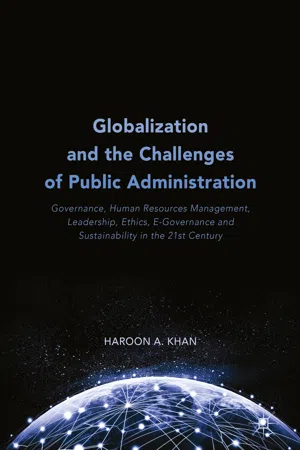This book is an attempt to understand the challenges of globalization and governance in the public sector. Many researchers make use of the term “governance” to describe the multitude of actors involved in the delivery of services. Although governance can be applied to different sectors of the society, for example, health care, education, and business, this book focuses on the governance of the public sector, the traditional task of public administration. The book analyzes the important aspects of public administration: human
resources management
(HRM), leadership, ethics and accountability, sustainability, and e-governance to understand the challenges of globalization.
Public administration can no longer be confined simply to a discussion of the government agencies, and their processes and procedures. Therefore, many researchers now use the term “governance” to understand the current dynamics of government. This book uses the terms governance and public administration interchangeably because the tasks of implementation require the cooperation of both the public and private sectors. To understand public administration, one has to consider the interplay of both formal and informal actors in the implementation of policies. Globalization implies the importance of the interaction between public and private sectors at both the domestic and global levels. Therefore, public administration faces enormous challenges in dealing with all the actors in delivering government services. Public administration does not exist in a vacuum. It has to deal with the environment, both internal and external, to implement the tasks of the government. Globalization is an important element for both the internal and external environment. Public organizations, both internally and externally, are influenced by global phenomena. For example, human resources management
(HRM) in the public sector requires a broader understanding of the culture and values of diverse people. It requires sensitivity to the global pressure in recruiting and training people in a changed environment. The public leadership must understand the global challenges that can impact the organizations. The public leadership is under increasing pressure to monitor the changes in the environment and take appropriate action. Globalization causes the leadership enormous challenges and responsibilities. Leadership needs to monitor the changes occurring in the world and be prepared to take the appropriate decisions affecting the public. Leadership no longer enjoys the monopoly in the control of the situation. Several actors and the situational variables can have an influence on the events in any country in which the leaders become reactive rather than the active policy maker.
Globalization has presented new challenges of ethics and accountability by confronting organizations with complex and interdependent issues. Moreover, the issues of ethics are now being scrutinized by the world public rather than simply the people within a country. Accordingly, ensuring accountability is complex because the actors are no longer under the control of a particular country or government. The involvement of the multiplicity of actors makes it difficult to ensure accountability and have made the demand for global
ethics a widespread phenomenon. One of the most crucial issues faced by present-day public administrators is to maintain environmental sustainability. In an attempt to address this issue, governments are responsible for building dams, bridges, infrastructure and providing for clean water and air. Therefore, public administrators can be viewed as responsible for implementing the rules and regulations sustaining the environment. Another important aspect of globalization is the use of technology to provide for government services. E-governance has become an important part of public administration and governments are responsible for developing an effective mechanism for e-governance. How to make e-governance accessible, and, simultaneously, participative and accountable, is one of the major challenges currently faced by public administrators.
The book deals with the challenges of HRM, leadership,
sustainability, e-governance, ethics, and accountability. An emphasis on these challenges will contribute to a better understanding of the present-day problems of public administration. The focus on human resources, sustainability, and leadership, will give us enlightening insights into the other crucial problems faced by public administration since although these issues are not the sole issues of public administration, a thorough understanding of them will shed light on today’s most pressing problems. The decision of
the United Kingdom on June 23, 2016 to leave the European Union (EU) is considered as a counter-movement against the processes of globalization. Immigration was viewed as one of the issues to have played a powerful role in voting to exit the EU. It is an important lesson for all countries. The election of Donald Trump
as US president in 2016 based on a counter-globalization agenda makes the challenges particularly prominent. However, the impact pf globalization is so pervasive and widespread that any action towards counter-globalization may produce a negative result. It will be worthwhile to observe whether globalization can sustain in an environment of counter-movements.
